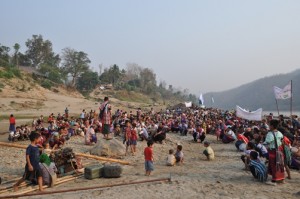2,000 Karens Gather on the Salween to Call for a Halt to Dam Plans
By Karen Environmental and Social Action Network • March 15, 2013 About 2,000 internally displaced people and villagers from the Wei Gyi area gathered yesterday at Ei Htu Hta Internally Displaced Persons (IDP) camp on the Salween riverbank to mark the International Day of Action for Rivers and Against Dams in an event organized by Karen Rivers Watch (KRW) and its local member Salween Eyes (SEE).
About 2,000 internally displaced people and villagers from the Wei Gyi area gathered yesterday at Ei Htu Hta Internally Displaced Persons (IDP) camp on the Salween riverbank to mark the International Day of Action for Rivers and Against Dams in an event organized by Karen Rivers Watch (KRW) and its local member Salween Eyes (SEE).
Six dams are being planned on the Salween River in Burma, including the Hat Gyi Dam in Karen State. With an installed capacity of 1,360 megawatts, the Hat Gyi project will cost US$2.6 billion, according to the US-based International Rivers. Thai NGO TERRA has said that 60 MW of power from the dam will be for Myanmar, while the rest will be sold to Thailand.
The Salween River basin has been inhabited by various indigenous peoples for generations, providing them with refuge, means of transport and nutritious food. If the dams are constructed, local people are sure to experience many negative impacts.
The event, organized to raise local voices about current and future impacts, was joined by environmental activists from other areas.
Paul Sein Twa, director of the Karen Environmental and Social Action Network (KESAN), said: “Today people in different parts of the world are commemorating this Day of Action to protect their rivers against mega-dams. Communities along the Salween share this common goal. We want to raise our voices to let governments and decision makers know of our sufferings and needs.”
“Local people do not want any dams on the Salween River, especially in Karen State, without the free, prior and informed consent of impacted communities. The government and the Karen National Union need to broaden the decision making process so that it is transparent, inclusive and democratic. Dam proponents need to apply international best practices and business due diligence in all their dam building projects.”
The ceremony was also attended by community leaders from Dawei, who are resisting massive development projects in their area, including dams. One of the leaders, Pati Saw Ko said:
“In the Dawei area, two dams will be built – one to produce electricity and the other to supply water for the Special Economic Zone (SEZ). Both dams have been temporarily suspended because the local villagers are standing against them.”
As part of the ceremonies, Christian, Buddhist, and Animist religious rituals were conducted. Afterwards, participants shouted the following slogans:
- Our priority need is: Peace, Peace, Peace!
- What we want is: No dams on the Salween River!
- Why we are calling for this: our Salween River must flow free
- All planned dams on the Salween River must be stopped!
In solidarity with local communities in China, Burma/Myanmar and Thailand who are calling for the free flow of the Salween River, a bamboo raft bearing a large banner: “Save Our Salween, No Dam” was floated down the river.
Ei Htu Hta IDP camp was set up on the bank of the Salween as a result of military attacks and human rights violations by the Burmese Army in 2006. Most of the 4,000 camp residents are ethnic Karens from Taungoo District, who have been supported with food rations and shelter by The Border Consortium (TBC). Already in fear of attacks by nearby Burmese troops, the IDPs are now fearful that the dam plans will lead to increased militarization, human rights abuses, environmental destruction, and loss of local livelihoods.
During the ceremony Naw Phyo Phyo, of the Karen Women’s Organization in Ei Htu Hta camp, said the government of Burma and foreign investors should not carry out any development projects including dams during this fragile ceasefire period, as genuine peace is not yet guaranteed.
“Current development projects will only benefit a few people – mainly governments and investors – but local people like us will face huge challenges, including permanent loss of our lands, displacement, hunger and severe flooding. This will have many negative impacts on our environment and our livelihoods.”
Pati Saw Ko said: “We all want development, but development must not bring suffering and difficulty for local communities.”
Contact person: Saw Paul Sein Twa + 66 821818562
Tags: Dams, Karen, Karen Environmental and Social Action NetworkThis post is in: Business and Human Rights, People's Voices, Press Release
Related PostsDevelopment for Whom?
Shan groups to Burma’s government: The Salween River is not for sale
Concerns about the Naung Pha dam on the Salween River
Balancing Human Rights and Environmental Protection with Diplomacy and Investment
Statement of concern regarding launch of IFC’s Hydropower Developers’ Working Group for Myanmar









 All posts
All posts